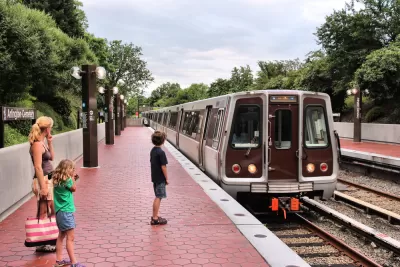The historically car-dependent county is hoping the planned revitalization of the Blue Line Corridor will boost the local economy and help maintain affordable housing.

In what Ethan Goffman calls "a radical break for a county with a history of developing in 'a spread out and automobile dependent' fashion," Maryland's Prince George’s County "has signed on to the transit-oriented development (TOD) revolution to boost its economy while helping the environment." According to the plan, "The Blue Line Corridor will become a major economic engine for the County by catalyzing development, creating jobs, and incentivizing the development of a sports and entertainment-branded corridor."
"The Blue Line would be the template for a much-needed economic boost for Prince George’s County that simultaneously helps the environment and maintains affordable housing." The plan "emphasizes business and economic development, crucial in a county with plenty of housing but relatively few jobs." Its authors hope it will attract large, institutional employers and raise the average annual salary in the area to a level closer to the rest of the D.C. region. "The plan’s second broad goal is to increase commercial tax collection by $100 million annually, enhancing much-needed local services. Third is increasing the population by 50,000 in areas near transit, including a mix of incomes and housing types."
"The plan’s fourth goal is preserving affordable housing and a diverse housing stock even in the midst of growth." The county also hopes to "increase food retail options in low-income areas to make fresh, healthy food widely accessible" and enhance "identifiable character" through public features and amenities.
"The plan is proactive on [the issue of displacement], calling for building 26,000 new residential units, 75% of which would be dedicated as affordable to households making less than 120% of the area median income," which could help fill the need for so-called 'missing middle' housing.
FULL STORY: Prince George’s County outlines plans for ambitious transit-oriented development along the Blue Line

Maui's Vacation Rental Debate Turns Ugly
Verbal attacks, misinformation campaigns and fistfights plague a high-stakes debate to convert thousands of vacation rentals into long-term housing.

Planetizen Federal Action Tracker
A weekly monitor of how Trump’s orders and actions are impacting planners and planning in America.

Chicago’s Ghost Rails
Just beneath the surface of the modern city lie the remnants of its expansive early 20th-century streetcar system.

Bend, Oregon Zoning Reforms Prioritize Small-Scale Housing
The city altered its zoning code to allow multi-family housing and eliminated parking mandates citywide.

Amtrak Cutting Jobs, Funding to High-Speed Rail
The agency plans to cut 10 percent of its workforce and has confirmed it will not fund new high-speed rail projects.

LA Denies Basic Services to Unhoused Residents
The city has repeatedly failed to respond to requests for trash pickup at encampment sites, and eliminated a program that provided mobile showers and toilets.
Urban Design for Planners 1: Software Tools
This six-course series explores essential urban design concepts using open source software and equips planners with the tools they need to participate fully in the urban design process.
Planning for Universal Design
Learn the tools for implementing Universal Design in planning regulations.
planning NEXT
Appalachian Highlands Housing Partners
Mpact (founded as Rail~Volution)
City of Camden Redevelopment Agency
City of Astoria
City of Portland
City of Laramie


























